#Lit shit post
Explore tagged Tumblr posts
Text
Wann macht endlich jemand einen Film, in dem Schiller durchgängig massivst schwäbelt und Goethe auch den übelsten Hessischen Akzent durchzieht? Wann???
#meine feldfrüchte wären gewässert#meine depression wäre geheilt#meine haut wäre reiner#LET THEM HAVE REGIONAL ACCENTS#Schiller#Goethe#linguistics#literature#just german things#schoethe#lit shit post
66 notes
·
View notes
Text
Let me settle this. No matter his age, a club would give him way too easy access to a variety of drugs I bet, so this would probably lead to him developing an addiction or... well, worse. (Ya know him.) So no, I don't think he should have been at the club.
i want to make a "he should've been at the club" post about hamlet but there's so much controversy about his actual age that i can't while still maintaining any claim to academic integrity
36K notes
·
View notes
Text
"I just finshed teaching myself calculus. What subject should I take next : colors of the rainbow or sounds farm animals make" i am fkn screaming.

oh and sorry for the quality, found in an old af folder
#shitty reddit screenshots#shitty screenshots#funny stuff#funny shit#funny post#funny memes#funny#humor#jokes#memes#lol#haha#lotr#lord of the rings#the lord of the rings#middle earth#the hobbit#lit#literature#english literature#jrr tolkien#tolkien#booklr#bookworm#books and reading#books#reading#bookblr#tumblr memes#dank memes
1K notes
·
View notes
Text



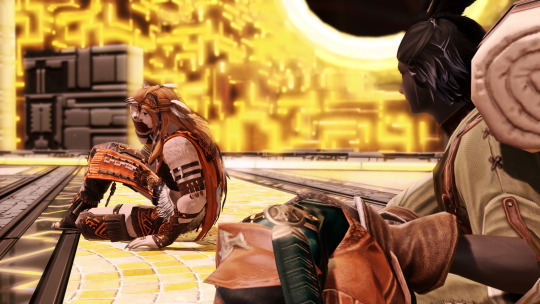
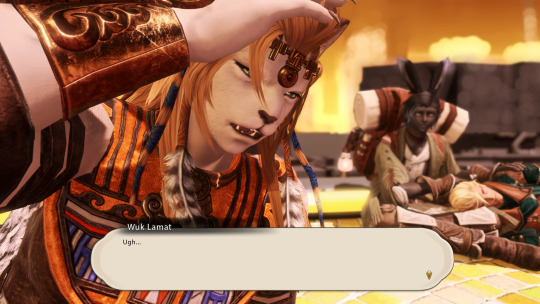
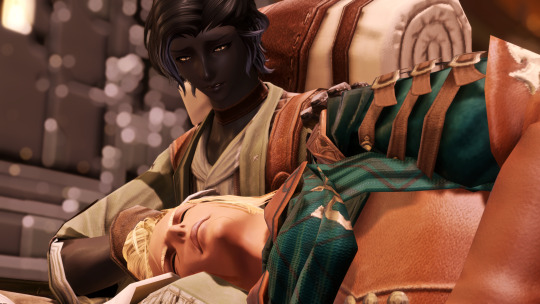

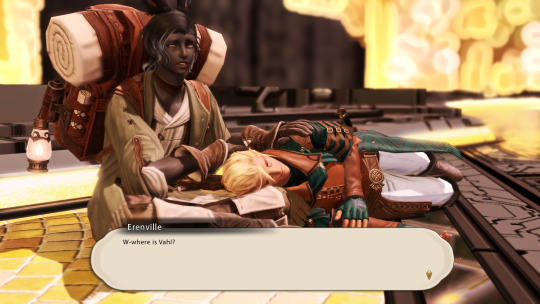

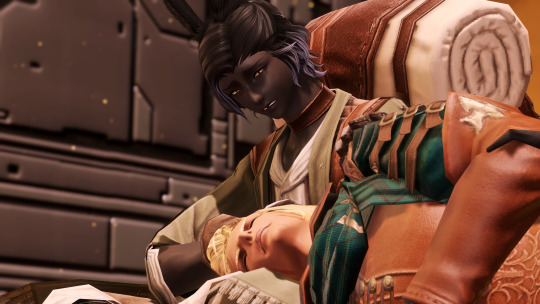
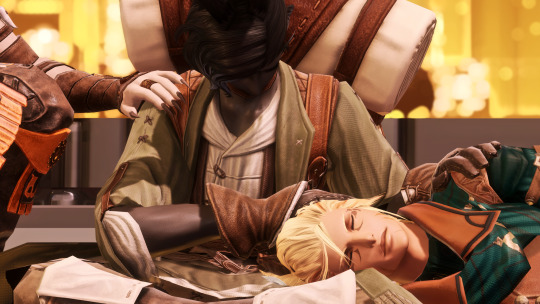

Fear
<previous - next>
#FFXIV#FinalFantasyXIV#Erenvahl#wolship#WoL x Erenville#X'vahl Tia#Erenville#part of me is like 'haha Erenville just sitting there with everyone's unconscious bodies'#but then the self-indulgent part of me is like#'but what if he just scooted over and rested X'vahl's head in his lap after they all passed out#because he's worried and doesn't know what else to do and also petting miqo'te ears is good for the soul.'#Erenville also currently does not give enough of a shit to pretend he wasn't in front of the others. He got other things on his mind.#Lamaty'i like 'I'll go get your boyfriend back for you bestie!'#because she is a real one.#this one was finished before the previous one#because I needed LM to still be lit up and colorful#but it has been sitting in my drafts for a while just waiting to be posted.
100 notes
·
View notes
Text
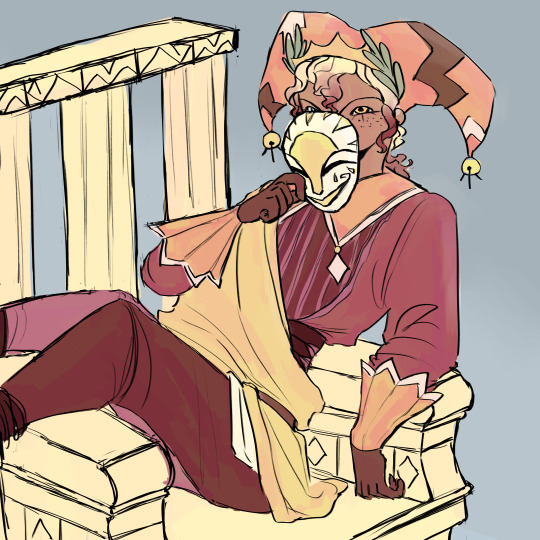
"A Jester can mock, and the King cannot fight
For the gift of free thought is the jester's one right."
A sweet golden prince who lived up in the sky,
Listened to his families' terrible fights,
The ceiling would rumble, the tile would shake,
The throne room was fragile, and soon it would break.
He'd attempt to speak, but it never went right,
His father would rage, and he'd lose every fight,
As decades passed by, it soon became clear,
The King saw his son as a monster to fear.
The Prince quickly followed every command,
Only to be trapped by his father's cruel hand,
Years of destruction with no end in sight,
This war would not end with a large act of might.
And so the Prince stopped fighting fire with fire,
And instead he pulled out his golden stringed lyre,
Since he had no respect, he would leave the King's cage,
And swap out the throne room for a shining stage.
He taunted with wit and he giggled with guile,
And even his sorrow he shared with a smile,
His father's gaze lessened, his temper was tame,
As his once "Golden Prince" treated life like a game.
The centuries passed and the mirth never ceased,
The sun never set on the first son of Greece,
He danced for his siblings and bit down his pain,
Since each peal of laughter meant there'd be less rain.
There's only one role for which there are no rules,
So who is the jester, and who is the fool?
#trials of apollo#toa apollo#lester papadopoulos#apollart#sunny speaks#pulled out everything I remembered from 11th Grade Lit for this poem hopefully it's not shit#I wanted to play on the idea that has been spoken about in some of my fave ToA meta essays#That being that Apollo consciously (or sub-consciously) makes himself seem weaker and less competent to avoid his father's wrath#it is a very interesting part of his character to me I love exploring it#and you know what maybe I also just wanted to draw Apollo in a jester outfit#y'all should know by now that 90% of my motivation is dressing Apollo/Lester up like a Ken Doll#haha#Lester the Jester#just thought of that#also peep my reference to the “my blorbo was born alongside the birth of Ancient Greece” hc that I posted like over a year ago#I just realized I rhymed right and fight twice in the poem GODDAMMIT#Guys I'm a horrible poet Apollo's gonna smite me :'(
284 notes
·
View notes
Text
I am too blunt and saucy.





sparknotes blog you are so dear to me
435 notes
·
View notes
Text

Home is where I want to be, but I guess I'm already there
I come home, she lifted up her wings. I guess that this must be the place
I can't tell one from another—Did I find you, or you find me?
There was a time before we were born
If someone asks, this where I'll be
Where I'll be
#brokeback mountain#ennis del mar#jack twist#heath ledger#jake gyllenhaal#annie proulx#ang lee#cowboys#gay cowboys#cowboy#gay cowboy#gay#mlm#queer cinema#queer lit#hey...hi...hello...#i actually dont just talk about brokeback mountain all day long contrary to popular belief. sometimes i also make art#i actually started this back in december for bbm's anniversary and in that time i discovered i have a new adversary:#drawing grass#but it's finished... it's finished... i can rest easy now knowing that ive finished this art that has singlehandedly killed my creativity#the art that i have been screaming shitting crying about struggling with for 7 months now#which will only get like 9 notes max#but that's OKAY. i did this for me. i needed to be the change i wanted to see in the world(seeing ennis looking at jack like he's the sun)#my art#still brokeback posting
356 notes
·
View notes
Text
RIP William Shakespeare, you would have loved the term "blorbo"
21 notes
·
View notes
Text
I know it's well-understood at this point that Kirk/Spock is much more of a nerd4nerd ship than a nerd/jock thing, but it's just been kind of percolating around my mind that both of them aren't just space nerds but space nerds who were personally bullied.
Like, 18-year-old Kirk was targeted by an older bully who combines "total asshole" with "the most grating man in existence":
MCCOY: Well, yeah, I'm beginning to feel a little bit picked-on, if that's what you mean. KIRK: I know the feeling very well. I had it at the Academy. An upperclassman there. One practical joke after another, and always on me. My own personal devil. A guy by the name of Finnegan. MCCOY: And you being the very serious young— KIRK: Serious? I'll make a confession, Bones. I was absolutely grim, which delighted Finnegan no end.
This was five years after Kirk survived a genocide, btw, and likely well before his stint as an Academy instructor known to be strict and demanding (which is the period the "stack of books with legs" description of him comes from). By the time he's 33, fifteen years after all this, it turns out one of his deepest fantasies is just beating the shit out of his bully, but only if he can do it According To The Rules (the replica of Finnegan sneers, "Always fight fair, don't you? True officer and gentleman, you").
Spock, meanwhile, is viciously targeted by his Vulcan peers for being biracial from at least age 5; he's described as being tormented by other boys by that age, and "at home nowhere except Starfleet." I think he'd have been 18 or 19 when he left for Starfleet and it's... the least bad of his options, but he seems to have spent his entire career among humans and being persistently subjected to raw racism and profound disrespect for his culture at every turn.
Like, their histories of being metaphorically shoved into lockers are not identical or anything, but I think it's interesting that they both have them.
#i feel like kirk and mccoy are generally seen as more temperamentally aligned despite kirk being emotionally closer to spock#spock representing cold logic and kirk and mccoy as the passionate emotional ones#but i feel like a) spock is wildly emotional just repressed. and coolly utilitarian in philosophy. and usually undemonstrative.#b) mccoy is highly intelligent and sometimes VERY much the voice of reason#(not typically cool rationality but certainly reason - he puts together clues that the others don't see on multiple occasions#he's not as easily derailed by obscuring details or over-cerebral analysis paralysis as the other two imo)#c) but mccoy sometimes struggles with the really big emotional shit and spock is more on kirk's emotional wavelength there#(this is especially obvious in conscience of the king and turnabout intruder but not only there - in both mccoy resists seeing#the full horror of the violations of the most basic rights that kirk has endured while spock is much more sensitive to those things)#and d) kirk is emotionally expressive but typically more cautious and measured in judgment than either of the others#more likely to formulate positions in terms of philosophical principles than mccoy's kneejerk sense of decency#(which sometimes is exactly what's needed and sometimes disastrously lacking in rigor and reflection)#or spock's often brutally utilitarian focus on outcomes that runs roughshod over... like. everyone.#that's why kirk is the mediator; he's not at the exact midpoint in every dispute#but broadly his personality and strengths/weaknesses fall pretty evenly between spock and mccoy#(interestingly i think this is especially noticeable with kirk's infamous seductions - which are rarely motivated by simple desire#they combine the focused perception and expressiveness of mccoy and the brutally self-denying calculations of spock#when sylvia exclaims that he seems warm and passionate but his mind is cold it's like... yeah. softly lit femme fatale james t kirk#it's like the unholy side of kirk's overall approach borrowing pretty equally from both mccoy and spock)#ANYWAY the point is that i don't think kirk is actually more similar to mccoy than he is to spock#and in particular his tendency to repress the horrors and focus on useful concrete action are very akin to spock#long post#anghraine babbles#star peace#otp: the premise#c: who do i need to be#c: i object to intellect without discipline#star trek: the original series#anghraine's meta
99 notes
·
View notes
Photo
Ok, but like. Hamlet’s response is also so good! “You are no truant.” It’s literally like:
Horatio: I felt like skipping school.
Hamlet: haha. Yeah, right! You felt like skipping school. Sure. 🙄😉

Okay, so the No Fear Shakespeare version of any play in the canon is bound to be unintentionally hilarious and raise more questions than answers, but I think Hamlet has to take the cake. I mean, look at this.
“I felt like skipping school, sir.”
He felt like skipping school.
Horatio crossed a pirate-infested ocean and went to a war-torn foreign country to go crash with a potentially unstable and undoubtedly depressed former classmate.
…So he could cut class.
Days later, you know, he’s surrounded by freshly stabbed and poisoned courtiers, his best friend’s dying in his arms–“hey, isn’t it, like, finals week or something? Dodged that bullet!”
#horatio literally arrives in Denmark and is greeted by a ghost and a teasing remark about his nerdiness from his emo boyfriend#sassy hamlet my beloved#Hamlet#horatio#hamratio#lit shit post#shakespeare
4K notes
·
View notes
Text

Sylvia Plath, Virginia Woolf, Oscar Wilde as well..
#booklr#booklover#english literature#sylvia plath#virginia woolf#jane austen#desi shit posting#desiblr#desi tumblr#books & libraries#book reading#wholesome posting#lol memes#humor#life#lit#classic literature#artists on tumblr#chaotic academia#books#book memes
93 notes
·
View notes
Text
Men in love are okay but women in love are jahil andhi khajur khali khopri
#random shit#shit post#mini rant#ranting#desi shit posting#desiblr#desi humor#memes of tumblr#desi indian#desi memes#desi moodboard#hindi memes#indian memes#urdu#urdumemes#pakistanimemes#desi rant#desi girl#girl memes#istg#fav#lit#reddit#lol#bollywood memes#relateable#relationship goals#related posts#txt post#txt
104 notes
·
View notes
Text
And some things, they become clearer when you close your eyes
#moon writes#moodboard#my poetry#original poem#poets on tumblr#for you#poetry#poetrycommunity#female poets#illustration#life quotes#literary quotes#quotes#quotations#lit#literature#writers on tumblr#female writers#writerscommunity#writers and poets#writeblr#writing community#romanticism#romanticizing life#desi academia#desi tumblr#desiblr#desi shit posting#thoughts#late night thoughts
44 notes
·
View notes
Text
Shakespeare: They're never letting me do anything on stage!!!
Also Shakespeare: *burns the Globe down with a cannon during a show*
Everyone, rightfully so: That's it. We're never letting him do anything on stage.
My favorite Shakespeare thing is when he writes a major plot point but just has someone tell us about it to save on special effects.
Hamlet gets kidnapped by pirates but we don’t see that part. It’s a letter.
The Oracle of Delphi shows up in the Winter’s Tale and rather than do all the special effects required to make that adequately supernatural, two guys come on stage and go “woah that was cool”
There’s a big storm on the night that Duncan is murdered and we learn about this when half the cast of Macbeth says “sure was stormy last night”
Shakespeare, the OG low-budget director taking the easy way out.
9K notes
·
View notes
Text
In defence of Will Ladislaw
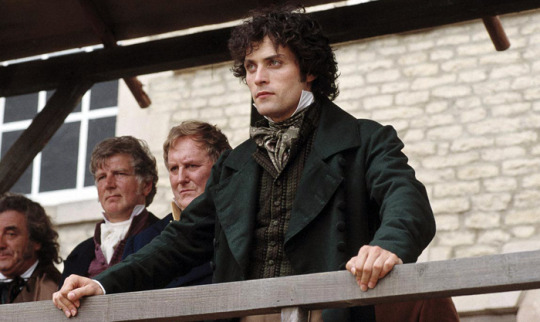
George Eliot's characterisation of Will Ladislaw is one of the few aspects of Middlemarch that is not universally praised, with no less a person than Henry James commenting in 1873 that he lacked “sharpness of outline and depth of color”, making him the novel’s “only eminent failure.” And while Will's character is certainly not as clearly defined as some of the other characters in the novel, I believe that this was absolutely intentional on Eliot's part. Middlemarch is full to the brim of characters who believe they know exactly what they want—not least among them, our two protagonists, Dorothea Brooke and Tertius Lydgate, whose ardent ambitions and inflexible attitudes lead them into catastrophic errors of judgement and unhappy marriages.
By contrast, Will's lack of strongly defined goals and his changeability are almost his defining character traits. He's aimless and pliable, prone to rapid mood swings and drastic career changes, with even his physical features seeming to "chang[e] their form; his jaw looked sometimes large and sometimes small; and the little ripple in his nose was a preparation for metamorphosis. When he turned his head quickly his hair seemed to shake out light."
Will’s inscrutability is closely tied to his ambiguous status within the rigid class structure and xenophobic society of Victorian England, with his Polish ancestry and “rebellious blood on both sides” making him a target for suspicion. He is repeatedly aligned (and aligns himself) with oppressed, marginalised, and outcast populations—Jewish people, artists, and the poor.
He serves as a narrative foil for characters like Lydgate and Edward Casaubon, who prioritise specialist expertise above all and are consequently incapable of broad knowledge synthesis. He critiques Casaubon's life's work as being "thrown away, as so much English scholarship is, for want of knowing what is being done by the rest of the world." By contrast, Will serves as Eliot's defence of the value of a liberal education. One of the first things that we learn about him is that he declines to choose a vocation, and instead seeks to travel widely, experiencing diverse cultures and ways of life. He has broad tastes and interests, trying his hand at poetry and painting before eventually pursuing a career in politics.
He also functions as a narrative foil for Dorothea. Will is initially apathetic to politics, whereas Dorothea initially professes herself to be disinterested in art and beauty. This is perfectly encapsulated in their exchange in Rome, when Dorothea declares, "I should like to make life beautiful—I mean everybody's life. And then all this immense expense of art, that seems somehow to lie outside life and make it no better for the world, pains one", to which Will replies, "You might say the same of landscape, of poetry, of all refinement [...] The best piety is to enjoy—when you can [...] I suspect that you have some false belief in the virtues of misery, and want to make your life a martyrdom.”
By the end of the novel, Dorothea unlearns some of her puritanical suspicion of sensual pleasure, whereas Will becomes more serious, compassionate, and politically engaged, dedicating his life to the accomplishment of humane political reforms. They are both flawed individuals, who ultimately become more well rounded through their relationship with each other. Admittedly, Dorothea's influence on Will is more significant than his on her—and once again, I believe that this was intentional on Eliot's part.
In my opinion, the negative response to Will Ladislaw at the time of Middlemarch's publication (and in the centuries since) was and is profoundly informed by gendered expectations of masculine dominance in romantic relationships. Will's marriage to Dorothea has often been described as disappointing, with many readers and critics viewing the ambitious Lydgate as the embodiment of the ideal husband that Dorothea outlines at the beginning of the novel—a talented man engaged in important work for the betterment of humanity, to whom she can devote herself.
However, one of the central themes of the novel is that people are often mistaken in their beliefs about what they want, and Dorothea's marriage to Edward Casaubon certainly demonstrates that she would not in fact be happy living her life in submission to a man who does not respect her opinions. I firmly believe that Lydgate's misogynistic attitudes and expectations would have made it impossible for him to be happy in a marriage of equals with a woman like Dorothea. He is explicitly drawn to Rosamond Vincy because she has "just the kind of intelligence one would desire in a woman—polished, refined, docile."
By contrast, George Eliot made a deliberate choice to pair Dorothea with a man who is not ashamed to be influenced by her, and indeed looks up to her as his moral superior. Through Dorothea's influence, Will discovers his life's work. In turn, by marrying Will, Dorothea is able to pursue her true passion. As a result of their influence on each other, these come to mean the same thing—reform. Thus, George Eliot grants Dorothea Brooke a subversively feminist, politically progressive, and profoundly cathartic ending: a life of companionate marriage, sensual pleasure, and meaningful work, in which Dorothea can devote herself (within the limited means available to her as a woman in the 19th century) to the achievement of just and compassionate reforms that "make life beautiful" for everybody—herself included.
#PUT SOME RESPECT ON HIS NAAAAAME#hello please enjoy this fucking essay that I wrote#I haven't cited them here bc I'm not insane but I did in fact read several academic articles while writing this post#so if you wanna see my sources/ do some further reading let me know#i love pouring all my fandom energy into content that no-one gives a shit about#(girl who just posted an Alias Grace fic that noone will ever read and is currently working on a Middlemarch fic noone will ever read voice#Middlemarch#George Eliot#Mary Ann Evans#Will Ladislaw#Dorothea Brooke#Edward Casaubon#Tertius Lydgate#classic literature#19th century literature#classic lit#books
154 notes
·
View notes
Text
Rereading Dracula, and without fail, every time, I am shocked at JHs naivety in Bistritz before meeting the count.
“Everyone looks at me so wistfully, almost as if they pity me, and my hosts have pleaded and begged me not to go, the wife going as far to give me her personally rosary. Gee I wonder what all that is about. Now it’s time to head off to this obviously cursed and terrifying castle. (Mem. to ask the count about these strange legends of ordog-devil and pokol-hell and stregoica-witch and vrolok-vampire, surely he knows where these silly little superstitions started)”
Like bruhh you really working hard to be this oblivious
#horror books#dracula#bram stoker#books and reading#reading community#reading list#readers#old books#books#2025 reads#currently reading#reading#books & libraries#books and libraries#romance books#classic literature#literature#lit#novel#irish literature#classics#classic lit aesthetic#classic lit quotes#haha#lol#funny#funny shit#funny stuff#humor#funny post
23 notes
·
View notes